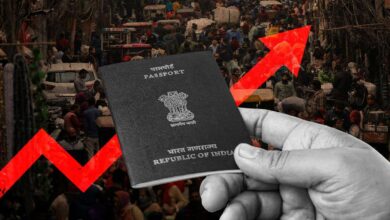The Adani Scam : Inside The $250 Million Bribery Scheme!
Gautam Adani and a group of officials have been accused of running fraud and bribery scheme involving $250 Million.

U.S. prosecutors have charged Indian billionaire Gautam Adani and his nephew Sagar Adani with running a large fraud and bribery scheme. Charges were filed by the U.S. attorney’s office in Brooklyn, New York, where it is alleged that the defendants engaged in a complex scheme involving $250 million in bribes to Indian officials while misleading U.S. and international investors.
Central to the scandal are Gautam Adani, the 62-year-old business tycoon worth about $70 billion, and his nephew Sagar Adani, executive director of Adani Green Energy Ltd (AGEL). The younger Adani went to Brown University after which he joined the family business in 2015 and has been found to be a key figure for the investigation, particularly after the FBI agents served him with a search warrant and grand jury subpoena in March 2023.
The Alleged Scheme: Bribery, Fraud And Cover-up
This is, according to the complaint filed by prosecutors, a multi-layered criminal enterprise that operated from 2020 until 2024.
Several interacting elements, so alleged by prosecutors, made up the scheme:
For example, it states that the defendants bribed Indian government officials to be awarded the lucrative contracts of solar power.For example, it is claimed that between August and November 2021, Gautam Adani met an official connected with Andhra Pradesh state three times during which he allegedly offered a bribe of Rs 1,750 crore ($210 million).
 Secondly, the indictment claims that the respondents fraudulently made false and misleading statements to U.S. and international investors with regard to their anti-bribery compliance programs. It is asserted that Gautam and Sagar Adani induced U.S. investors to purchase Adani Green bonds while deceitfully misrepresenting anti-corruption practices existing within the company and their bribery activities.
Secondly, the indictment claims that the respondents fraudulently made false and misleading statements to U.S. and international investors with regard to their anti-bribery compliance programs. It is asserted that Gautam and Sagar Adani induced U.S. investors to purchase Adani Green bonds while deceitfully misrepresenting anti-corruption practices existing within the company and their bribery activities.
This scheme apparently became more complicated when the problems began with the Solar Energy Corporation of India(SECI). As SECI was unable to get any buyers for this power at the contracted prices with Adani and Azure Power, the defendants allegedly organized a series of meetings with government officials in 2021 and 2022, offering them bribes in securing these power sale agreements.
Allegations of Systematic Manipulation
Prosecutors have alleged that defendants systematically used manipulation of regulatory and market structures to gain an undue advantage. This was done through connections with government officers and through the influence of public agencies in changing policies and decisions according to the convenience of Adani Green Energy. This alarms us of a latent connectivity between business and political powers, and thus poses grave questions over governance and control of regulation in India.
Investigation And Evidence Trail
 FBI in its investigation, had clarified clear chronologies of events and evidences. Crucially, it is reported that in March 2023, FBI special agents served Sagar Adani with a search warrant and grand jury subpoena. The warrant allowed the seizure of electronic devices and evidence related to bribe payments and kickbacks to the Indian Government’s officials.
FBI in its investigation, had clarified clear chronologies of events and evidences. Crucially, it is reported that in March 2023, FBI special agents served Sagar Adani with a search warrant and grand jury subpoena. The warrant allowed the seizure of electronic devices and evidence related to bribe payments and kickbacks to the Indian Government’s officials.
Specifically egregious is a discussion that allegedly occurred at a meeting in Ahmedabad on April 29, 2022. Prosecutors claim Gautam Adani shared personal actions he had taken to make bribery payments to officials and discussed concealing these transactions from regulators. The discussions were said to include the transfer of a 4 GW supply tender to Adani Green Energy as well as the method for transferring the related payments.
Evidence obtained by the FBI includes detailed electronic documents, including emails, financial spreadsheets, and audio recordings. The prosecutors highlighted the role these documents play in unwinding the scope of the alleged conspiracy. Unnamed insiders are said to have testified that support the existence of the bribery scheme.
Potential Cover-up Of Crime
The investigation has even found proof of potential attempted obstruction of justice. While being served the FBI warrant, the group’s insider alleged to have immediately called his uncle Gautam Adani and taken pictures of each page of the search warrant in order to send them to him. In March 2023 when he first learned of the investigation, the Adani Group allegedly did not notify SEBI (Securities & Exchange Board of India) or their investors of the fact.
According to court documents, the scam cover-up was not restricted within India. US prosecutors stated that the scheme had utilized off-shore entities and intermediaries in forwarding bribes and obscuring financial transactions. It appears the entities were set up in tax havens, throwing serious questions into the greater financial practices of the Adani Group.
Role Of SEBI And International Agencies
The scandal has also brought Indian regulators under the scanner. The SEBI is accused of not acting promptly enough despite earlier allegations of financial irregularities against the Adani Group. With U.S. regulators now in the fray, the scandal brings to the fore lapses in international collaboration on investigations into corporate fraud.
Market Impact And Broader Implications
Adani Group has faced immediate and severe consequences from these charges. The news saw a huge sell-off in Adani Group companies with shares plummeting by as much as 25% on one trading day, subsequently wiping off about Rs 2.6 lakh crore (more than $31 billion USD) of the market value. In a reaction to the crisis, it was forced to cancel its planned U.S. dollar-denominated bond sale by Adani Green Energy.
 The scandal has also reignited political controversy in India. Opposition leader Rahul Gandhi added more fuel to the fire, focusing on Adani’s close ties with Narendra Modi, the prime minister of India. Gandhi accused Modi of overprotecting Adani, as he said the PMO had allegedly intervened on several occasions to protect the interests of Adani Group. These allegations have given political dimensions to the battle that is unfolding in US courts and fuelled the demands for independent investigation into the case in India.
The scandal has also reignited political controversy in India. Opposition leader Rahul Gandhi added more fuel to the fire, focusing on Adani’s close ties with Narendra Modi, the prime minister of India. Gandhi accused Modi of overprotecting Adani, as he said the PMO had allegedly intervened on several occasions to protect the interests of Adani Group. These allegations have given political dimensions to the battle that is unfolding in US courts and fuelled the demands for independent investigation into the case in India.
The Hindenburg Research report released in January 2023 also darkens this scandal. Accusations of financial malpractices by short sellers already cast shadows over the transparency and governance of Adani Group’s companies. Although the group circumvented the initial impact of the Hindenburg report, the U.S. indictment has once again cast doubts on the long-term survivability and credibility of the conglomerate.
Adani Group’s Defence
 All the allegations have been denied strongly by the Adani Group, which claims to be “baseless” and vows to maintain “the highest standards of governance, transparency, and regulatory compliance.” A statement from the group said it was cooperating in all the legal processes and it would prove its innocence.
All the allegations have been denied strongly by the Adani Group, which claims to be “baseless” and vows to maintain “the highest standards of governance, transparency, and regulatory compliance.” A statement from the group said it was cooperating in all the legal processes and it would prove its innocence.
However, the group’s statement has done little to soothe investors. Analysts warned that the case could bring long-term damage to the reputations of the Adani Group, and thus make it harder for them to attract foreign investments. Corporate governance and political favoritism concerns are expected to top the controversy as it unravels.
Efforts to Rebuild Confidence
As a response to the crisis, the Adani Group announced plans to strengthen the internal compliance programs and engage international legal experts. However, critics say that such an attempt only adds to the gravity of allegations to rebuild investors’ confidence.
International Implications
There is an aspect of the scandal that has far broader implications for Indo-U.S. business relations. The case forms one of the most important cases concerning an Indian company in U.S. courts, potentially setting a precedent for how American regulators will approach allegations involving corruption by foreign entities. It also betrays growing scrutiny faced by Indian conglomerates as they keep stretching their global footprints.
Foreign investors, especially institutional stakeholders, will look to reassess their exposure to Indian companies because of transparency and regulatory oversight issues. The case will further keep Indian regulators on the back foot regarding corporate fraud and political corruption with SEBI and other agencies coming under increased pressure to respond more vigorously.
The Road Ahead
While the case against the Adani Group in the U.S. proceeds, it is going to be watched closely by the global business community. Guilt will not only mean significant sentences for those convicted but might also establish a mark for strict accountability in cross-border corporate fraud. For India, the scam is going to be a rude awakening to the imperative necessity of stronger regulatory frameworks and ethical governance to sustain the trust of investors in the country.




